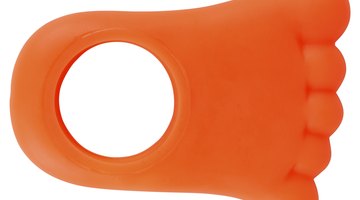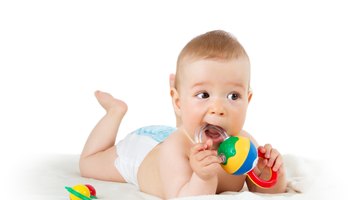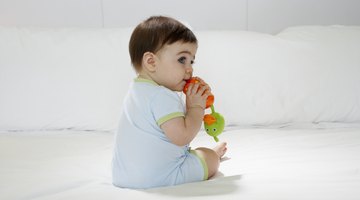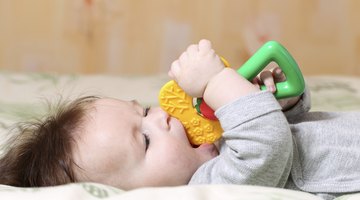Can Teething Cause Congestion?
Congested Baby: Is It One More Sign of Teething?
Among the many milestones babies meet in their first year, teething is probably not one of the most enjoyable. Even the sweetest baby can turn into a hot, fussy mess as those first few teeth work their way through the gums. There are usually a few symptoms of teething you might notice, but congestion isn’t one of them.
When Teeth Come In

How to Safely Use Ice Cubes With Teething Babies
Learn More
Your little one will probably cut his first tooth somewhere between 6 and 12 months, but a few babies cut teeth earlier. Don’t be fooled when your baby starts putting everything, including his hands, in his mouth and producing a lot of extra saliva around 3 months. Many parents see this and expect the first tooth any day, but usually this is just a new way for your little one to explore his world.
Usually, the bottom two front teeth pop up first, followed by the top two a month or two later.
Signs of Teething
If you’re one of the lucky parents, your little one will cut her teeth without batting an eyelash. Many babies, though, show at least one of the following symptoms:
- Swollen, tender gums
- Fussiness and crying
- A slight temperature
- Constant gnawing or wanting to chew on things
- Excessive drool
- Changes in eating or sleeping patterns
Congestion in Babies
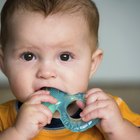
Teething & Congestion
Learn More
Teething might be the culprit behind many symptoms in your baby, but congestion isn’t one of them. If your little one is congested, it is most likely caused by the common cold, the flu or seasonal allergies.
Generally, if it’s a cold or the flu, the best approach is to let it run its course. These are caused by viruses, so antibiotics won’t help. Usually, a virus resolves in 10 to 14 days. Make sure your little one gets plenty of fluids, and run a humidifier to keep the air moist. If your baby is younger than 3 months, contact his doctor. With babies this little, the common cold can quickly turn into croup or pneumonia.
For older babies, contact your doctor if any of the following symptoms apply:
- Congestion for longer than two weeks
- Fast breathing along with a fever and cough
- Barking cough
- Ear pain
- Temperature above 100.4 degrees
- Red eyes or a yellow or greenish discharge from the eyes
- Thick, green discharge from the nose for several days
If you think allergies are causing your baby’s congestion, talk to your doctor. The type of treatment depends on the cause of the allergy.
Teething Remedies
Fortunately, if your little one is uncomfortable during teething, you can help in a few different ways. Massage her gums with a clean finger. Watch your finger once she starts cutting those teeth. As little as new teeth are, they’re sharp.
You can also give her a solid teething ring or a clean, frozen washcloth, spoon or pacifier. Doctors don’t recommend frozen liquid-filled teething toys because they might be too cold for your little one’s mouth. Clean anything your baby chews on after she’s done.
If she’s older than 6 months, give her a hard, unsweetened teething cracker to gnaw on or a sippy cup of cool water. Keep an eye on her as you do with any food or drink to prevent choking.
If your baby still seems uncomfortable, talk to your pediatrician about giving her a pain reliever such as acetaminophen or ibuprofen.
Teething Remedies to Avoid
You might have heard great things about teething tablets, gels or amber teething necklaces, but doctors say not to use any of these methods of pain relief. Teething tablets and gels both contain ingredients designed to numb pain, but the Food and Drug Administration warns against using them because of potential serious side effects. Teething necklaces can be a strangulation risk around your baby’s neck and a choking hazard if they break apart.
Teeth-Cleaning Tips
Once your little one cuts her first tooth, you should start brushing it. Of course, brushing a 6-month-old’s teeth is comparable to trying to give a cat a bath, but do your best. Brush twice a day with a tiny smear of fluoride toothpaste, about the size of a grain of rice. It’s especially important to brush after your baby’s last food or drink of the day.
It’s best to set up your little one’s first pediatric dentist appointment after he cuts his first tooth, but no later than 1 year of age.


